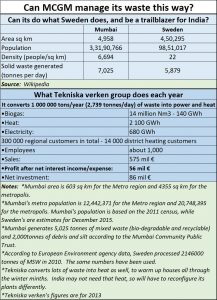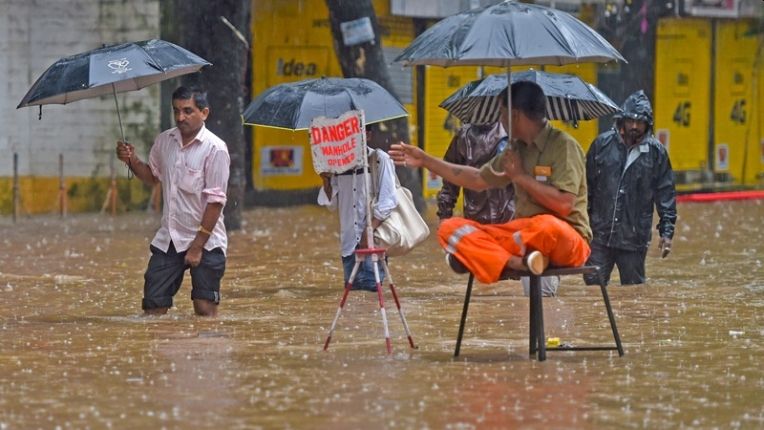https://www.freepressjournal.in/analysis/misplaced-zeal-for-environment-and-water
Cities haven’t yet learnt how to deal with water and the environment
RN Bhaskar – 18 July, 2019
Crisis, it is believed, brings out the best – or the worst – in people. So it was when Mumbai experienced its predictable downpour.
Everyone expected it. But the Municipal Corporation of Greater Mumbai (MCGM) was caught unprepared. Parts of Mumbai flooded. Walls caved in (one of them built at a reported cost of an unbelievable Rs.21 crore — https://www.freepressjournal.in/mumbai/blacklisted-contractor-built-malad-wall-claims-leader-of-opposition-in-bmc), people died, and yet the MCGM spokesperson pointed out how his department has pushed out into the sea almost two lake-fulls of water.
 Predictably, the official faced a lot of flak. Shouldn’t the MCGM have been the first in the state to go in for large-scale water harvesting? After all, heavy downpours have now become an annual feature. Instead of letting the water go into the sea, wouldn’t it have made more sense to create large (artificial) lakes where the water could go? As Warren Buffet once remarked, it is only when the tide runs out, that you actually know who is swimming naked.
Predictably, the official faced a lot of flak. Shouldn’t the MCGM have been the first in the state to go in for large-scale water harvesting? After all, heavy downpours have now become an annual feature. Instead of letting the water go into the sea, wouldn’t it have made more sense to create large (artificial) lakes where the water could go? As Warren Buffet once remarked, it is only when the tide runs out, that you actually know who is swimming naked.
Take reaction #2: An elected representative pointed out that parts of Mumbai got flooded because the pumps were choked with plastic. Wouldn’t it have been sensible to put up layers of filters in front of the pump to ensure that plastic did not choke the system? Swimming naked, huh!
Take reaction #3: Another elected representative called for a more wide-sweeping ban on the use of plastic. Really? Has the minister even cared to know that Singapore, one of the cleanest cities, has not banned plastic?
Could we invite him to view the 3-minute video on how Singapore manages its plastic waste. It can be found at https://www.youtube.com/watch?v=Dei_duocsu4&feature=youtu.be. The right way to deal with plastic is to incinerate it, and use the heat to create energy.
In fact, it is perplexing why the MCGM has not yet put into place a mechanism for converting all waste into energy – that this author has been advocating since 2013 (http://www.asiaconverge.com/2014/08/lessons-we-can-learn-from-sweden-in-waste-management/). Take a look at the table alongside. Sweden converts all its waste into energy, hence revenues, and churns out a profit too. As a result, the country is clean, people healthier and the country richer. So successful is Tekniska Verken, Sweden’s largest waste management facility, that it has begun importing forest waste from Norway and the UK to feed its expanded waste-to-energy capacities. There is no reason why Mumbai cannot adopt this Swedish model.
Clearly, banning is never an answer. Finding proper solutions is the key. Somehow, Indian law-makers love bans. Can’t cope with something? Well, ban it. What bans do is to give rise to an (uncontrollable) army of state sponsored vigilantes. Alternatively, it gives rise to other half-baked alternatives that are equally, if not more, harmful. For instance, the synthetic woven bags that are now being used instead of plastic appear to be biodegradable. But the plastic disintegrates into tiny pieces which remain plastic fragments in water, and are swallowed by sea-life. Humans later ingest this plastic.
The good thing for Mumbai to do is to adopt the Israeli model. It should allow all waste – dry and wet – to get collected and taken to central waste-to-energy plants at central dumping grounds, where they are converted into energy day and night – 365 days a year. Unlike the European penchant for segregating waste, the Israeli model requires all waste to be collected, put into a large tank and let centrifugal forces separate the waste. The circular motion of the water, separates waste and puts it in layers which can then be mechanically segregated, with a watchful eye removing some odd items manually. This method is more citizen friendly, faster, and far more efficient.
When waste is treated into energy, the city becomes cleaner – there is just no need for landfills. When the city is clean, people become healthier, and that reduces the government’s healthcare bills. And that in turn makes its population that much more productive and profitable. And the waste-to-energy plants can churn out profits themselves, and give rise to a host of new jobs not imagined earlier. If MCGM does its work well, it could even begin importing waste from other cities and expand its operations and increase it profits.
But that will require political will. And vision. MCGM will also need to keep vested interests away from the grease that the garbage mafia generates, even by billing the MCGM with ever increasing charges for cleaning and garbage removal.
Are the city fathers listening?



































COMMENTS